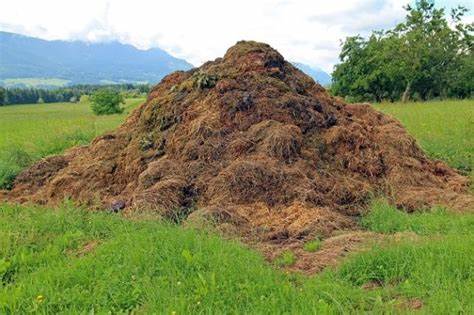Cow dung compost, known as a natural fertilizer, plays a vital role in agriculture. It is not only environmentally friendly but also enhances the quality of the soil, leading to increased crop yields. The use of cow dung compost in farming has been prevalent since ancient times and continues to be an extremely beneficial tool for farmers today.
गोबर खाद, जिसे प्राकृतिक उर्वरक के रूप में जाना जाता है, कृषि के क्षेत्र में एक महत्वपूर्ण योगदानकर्ता है। यह खाद न केवल पर्यावरण के अनुकूल है, बल्कि यह मिट्टी की गुणवत्ता को भी बेहतर बनाता है, जिससे फसल की उपज में वृद्धि होती है। गोबर खाद का उपयोग प्राचीन समय से ही खेती में किया जा रहा है, और आज भी यह किसान भाईयों के लिए एक अत्यंत लाभकारी साधन है।इस लेख में हम गोबर खाद के बारे में विस्तार से जानेंगे...
मिट्टी की गुणवत्ता में सुधार: गोबर खाद से मिट्टी में कार्बन, नाइट्रोजन, और अन्य पोषक तत्व मिलते हैं जो मिट्टी को उपजाऊ बनाते हैं। यह मिट्टी की संरचना को बेहतर करता है और उसमें जल धारण क्षमता को बढ़ाता है, जिससे फसल को बेहतर पोषण मिलता है।
खाद्य सुरक्षा में सहायता: गोबर खाद में मौजूद पोषक तत्व फसलों की वृद्धि के लिए अत्यंत आवश्यक होते हैं। इसके उपयोग से फसलों में पत्तियां, फूल और फल अच्छे से विकसित होते हैं, जिससे कुल उपज में वृद्धि होती है।
मिट्टी में सूक्ष्मजीवों की सक्रियता बढ़ाना: गोबर खाद में जीवाणु और अन्य सूक्ष्मजीव होते हैं, जो मिट्टी की उपजाऊ शक्ति को बढ़ाने में मदद करते हैं। यह सूक्ष्मजीव मिट्टी के स्वास्थ्य के लिए अत्यंत महत्वपूर्ण होते हैं, क्योंकि ये मिट्टी में पोषक तत्वों को उपलब्ध कराते हैं।
पर्यावरण के अनुकूल: गोबर खाद एक जैविक उर्वरक है, जो रासायनिक उर्वरकों का विकल्प है। रासायनिक उर्वरक पर्यावरण को नुकसान पहुँचाते हैं, जबकि गोबर खाद का कोई दुष्प्रभाव नहीं होता, यह प्राकृतिक है और पर्यावरण के अनुकूल है।
कृषि लागत को कम करना: गोबर खाद का उपयोग करके किसान रासायनिक उर्वरकों पर खर्च को कम कर सकते हैं। यह खाद कृषि लागत को घटाती है, जिससे किसानों को आर्थिक लाभ होता है।

गोबर खाद बनाने की प्रक्रिया सरल है। इसके लिए ताजे गोबर को उचित मात्रा में सूखा पत्तियां, घास, या अन्य जैविक पदार्थों के साथ मिश्रित करना होता है। फिर इसे ढककर समय-समय पर पलटते हुए, इसे कम्पोस्ट होने का समय दिया जाता है। लगभग 2-3 महीने के भीतर यह खाद तैयार हो जाती है, जो पूरी तरह से पौधों के लिए सुरक्षित और पोषक होती है।
यह भी पढ़ें: खाद की पूरी | नीम खली
गोबर खाद का उपयोग खेती में एक बहुत ही प्रभावी उपाय है, जो न केवल खेतों की उर्वरता बढ़ाता है, बल्कि पर्यावरण के लिए भी लाभकारी है। किसानों को इसे अपनाने की सलाह दी जाती है ताकि वे अधिक उपज प्राप्त कर सकें और कृषि में लागत को कम कर सकें। गोबर खाद के उपयोग से कृषि के क्षेत्र में एक स्थायी और सुरक्षित भविष्य की ओर कदम बढ़ाया जा सकता है।
कृषि से संबंधित वीडियो देखने के लिए यहाँ क्लिक करें: YouTube
Improvement in Soil Quality: Cow dung compost adds carbon, nitrogen, and other nutrients to the soil, making it more fertile. It improves the soil's structure and increases its water retention capacity, providing better nourishment for crops.
Assistance in Food Security: The nutrients in cow dung compost are essential for crop growth. Using it helps crops develop healthy leaves, flowers, and fruits, resulting in an overall increase in yield.
Increased Microbial Activity in the Soil: Cow dung compost contains bacteria and other microorganisms that enhance the fertility of the soil. These microorganisms are crucial for soil health, as they help in making nutrients available to the plants.
Environmentally Friendly: Cow dung compost is an organic fertilizer and a natural alternative to chemical fertilizers. Unlike chemical fertilizers that harm the environment, cow dung compost is eco-friendly and does not cause any adverse effects.
Reduction in Farming Costs: By using cow dung compost, farmers can reduce their reliance on expensive chemical fertilizers. This lowers the overall agricultural costs, leading to economic benefits for farmers.
The process of making cow dung compost is simple. Fresh cow dung is mixed with the right amount of dry leaves, grass, or other organic materials. The mixture is then covered and turned periodically to allow it to decompose. The compost is ready in about 2-3 months and is safe and nutritious for plants.
The use of cow dung compost in farming is an effective method that not only increases soil fertility but also benefits the environment. Farmers are encouraged to adopt it for better yields and reduced farming costs. By using cow dung compost, farming can move toward a sustainable and secure future.
0
0